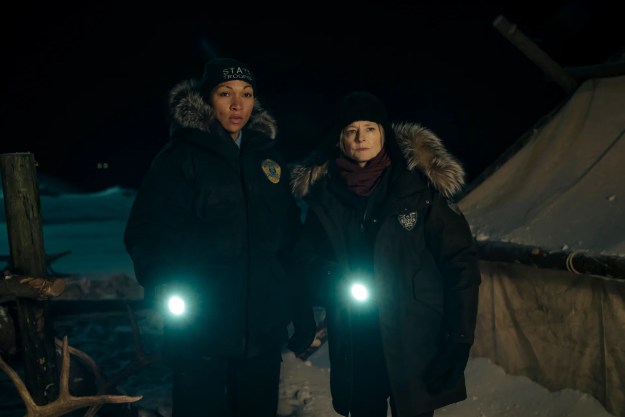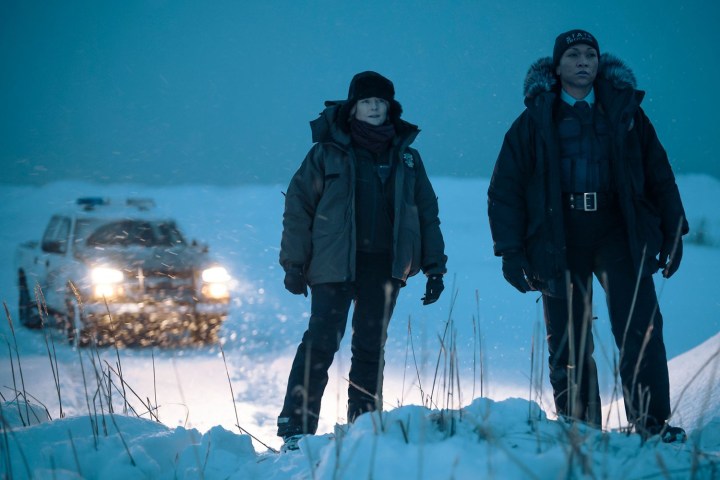
“True Detective: Night Country is an immersive, surprisingly scary continuation of the HBO crime anthology series.”
- Jodie Foster's commanding lead performance
- Kali Reis, Finn Bennett, and Fiona Shaw's memorable supporting turns
- Issa López's confident, hypnotic direction
- A few underbaked subplots throughout
- A finale that doesn't completely stick its landing
When True Detective premiered on HBO in 2014, it felt like a shot in the arm. It was cinematic and engrossing, and it immediately captured viewers’ attention. A year later, however, the show’s second season was almost universally viewed as a disappointment, and while its Mahershala Ali-led third season felt a bit like a return to form, True Detective remained incapable of matching the highs of its first season. When it was announced in 2020 that creator Nic Pizzolatto had left HBO to start a new partnership with FX, it looked like the series never would reach those early heights.
Against all odds, though, True Detective returns this week. The series’ long-awaited fourth season, True Detective: Night Country, comes from Tigers Are Not Afraid filmmaker Issa López, who secured the behind-the-scenes support of not only HBO, but also Moonlight and The Underground Railroad director Barry Jenkins. It’s the first True Detective season in which Pizzolatto doesn’t have a single writing credit, but longtime fans of the show need not worry. Night Country doesn’t just prove that HBO and Jenkins were right to put their faith in López; it also emerges throughout its six episodes as the most memorable, engaging, and distinct True Detective season since the show’s first.

Directed entirely by López and written mostly by her as well, True Detective: Night Country successfully recaptures a lot of what made this unlikely TV franchise seem so unique in the first place. The series’ first season was consistently elevated by the artistic, dreamlike direction of its director, Cary Joji Fukunaga, and the contemplative, entrancing performance given by its star, Matthew McConaughey. Despite those facts, the two seasons that followed it abandoned the one-director rule of its first, and while performers like Rachel McAdams, Colin Farrell, and Mahershala Ali did their best to elevate the material they were each given by Pizzolatto, none of them were able to bring the same intensity and strangely hypnotic gravitas that McConaughey did.
Night Country doesn’t fall victim to those same mistakes. Behind the camera, López embraces the surreal nature of True Detective’s acclaimed first season, packing Night Country’s six episodes with enough haunting visual motifs, hallucinations, and moments of spiritual reckoning to give it the nocturnal, ghostly feel that its story demands. As Pizzolatto did with McConaughey, López also finds a star capable of wrapping their hands fully around the season’s material in Jodie Foster, who co-leads Night Country as Liz Danvers, the steely, short-tempered police chief of the perpetually chilly, remote Alaska town of Ennis. Liz is, like McConaughey’s Rust Cohle before her, carrying the collective weight of several unresolved tragedies from her past when Night Country begins.
She doesn’t filter it through the same nihilistic tangents as her True Detective predecessor, but her pain does slowly, but surely rise back to the surface when Liz is forced to investigate the sudden disappearance of a team of scientists who seemed to live peacefully in a well-funded lab located on the outskirts of Ennis. Once it becomes clearer that the scientists’ disappearances were violent — and potentially supernatural — in nature, Liz feels obligated to reteam with her former partner, Evangeline Navarro (Kali Reis), a guarded, but empathetic Ennis police trooper with knowledge of other unresolved local cases that may connect back to Night Country‘s central mystery.

True Detective: Night Country wisely doesn’t try to integrate every element of the show’s original three seasons into its story. It abandons the multi-timeline structure of True Detective’s first and third seasons — opting instead to sprinkle in flashbacks throughout its episodes that offer brief, often haunting glimpses into its leads’ traumatic pasts. It doesn’t have as many ruminative cop car conversations between Foster’s Liz and Reis’ Evangeline as some True Detective fans may have hoped, either, but it nonetheless builds a dynamic between the two characters that is both prickly and compassionate, and which inevitably calls to mind some of the show’s past relationships.
Navarro and Danvers’ scenes are further elevated by the performances given by Foster and Reis. The former is the season’s clear standout — Foster is better here than she’s been in years, and she plays all of Liz’s many faults with so much unwavering conviction that you never wonder why she’s able to steamroll practically everyone who crosses paths with her. While Reis, a former boxer, takes an episode or two to seem truly comfortable in her part, her chemistry with Foster proves to be more than strong enough to supply True Detective: Night Country with the emotional foundation that its layered and ambitious plot needs.
Opposite them, Finn Bennett gives what has all the makings of a breakout performance as Peter Prior, the good-natured young cop that Foster’s Liz takes under her wing. Killing Eve and Andor standout Fiona Shaw also shines as Rose Aguineau, a solitary woman who lives on the outskirts of Ennis and who seems uniquely tapped into the region’s supernatural power. Shaw’s Rose helps introduce some of the otherworldly elements that prove important to understanding the story of Night Country, which easily ranks as the scariest True Detective season to date. The HBO series completely moved away from the cosmic horror aspects of its first season in its second and third, but Night Country brings them back with full force.

López commits to the spooky edges of her crime story by filling the season with surprise jump scares, eerie spectral appearances, and reality-bending instances of pure horror, all of which imbue Night Country with an added sense of unearthly danger that keeps it afloat even in its quietest and most languid moments. Its additional layers of horror help make up for the fact that Night Country, like every True Detective season before it, struggles to tie together all of its threads and deliver a completely satisfying conclusion in its finale. The season, thankfully, doesn’t completely miss the mark so much as it lands just a few inches away from hitting a bull’s-eye.
As compelling as its various mysteries often are, the ultimate allure and power of True Detective: Night Country lies in just how immediately and firmly it’s able to lock you in its own, cold embrace. It’s a season of television that knows exactly when to loosen and tighten its hold on viewers, and its ability to do so without ever losing your interest or overwhelming you is a testament to the level of artistry that’s on display throughout it. It may have taken 10 years, but True Detective finally looks as impressive as it once did.
True Detective: Night Country premieres Sunday, January 14. New episodes air Sundays on HBO. Digital Trends was given early access to all six of the season’s episodes.
Editors' Recommendations
- All the True Detective seasons, ranked
- Don’t watch the 2024 Super Bowl, watch these 3 great TV shows instead
- 5 winter crime thrillers like True Detective: Night Country you should watch now
- 5 most anticipated HBO and Max shows of 2024
- Bad Sisters review: Blood is thicker than murder in Apple TV+’s smart comic thriller




